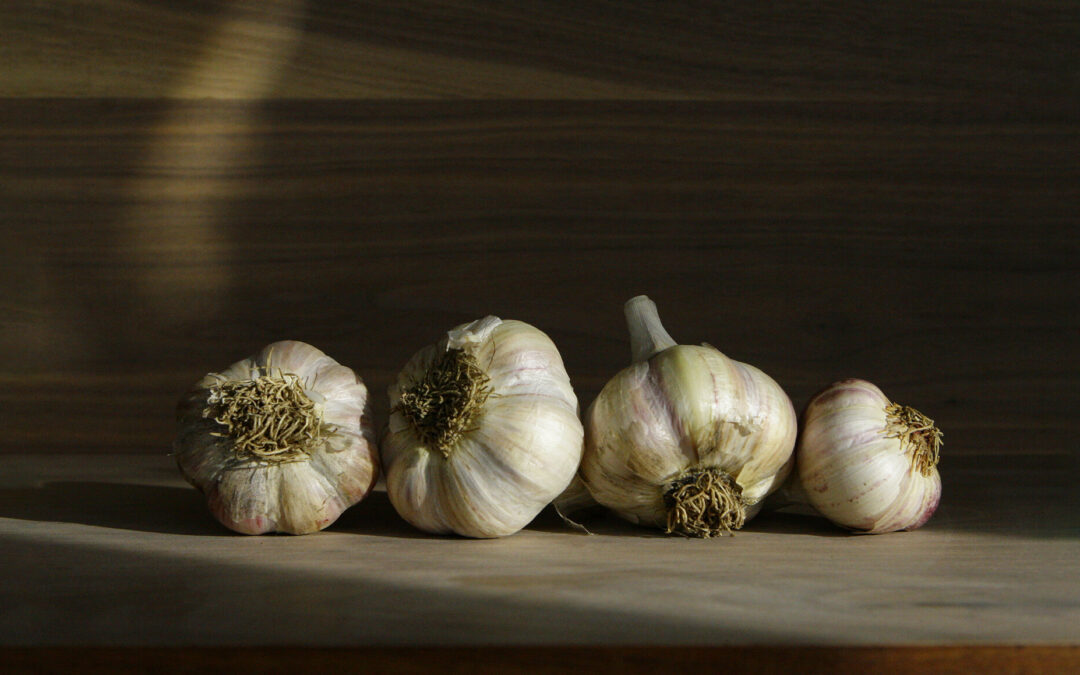High quality produce with a positive impact
Brandi Ranger, of Bessette Creek Farm in British Columbia, decided to grow her farm’s garlic organically because she and her family wanted to produce high quality food that also had a positive impact on the environment.
“[That] is very important to us as a family,” Ranger said.
Through traditional organic farming methods like the use of cover crops and crop rotation, Bessette Creek Farm improved the quality of their soil, reduced their water usage, and now better retains moisture in their soil even during the driest months of the year.
The benefits of organic farming have been many. Ranger appreciates that the sustainable organic practices Bessette Creek employs allows the farm to serve their local community. “We’re able to continue providing beautiful garlic to repeat and new customers,” she said.

Certifciation: Challenges and triumphs
Although maintaining an organic operation has many benefits, challenges do arise. Ranger noted that one challenge that transitioning and experienced organic operators face is the expense and time waiting on approvals and reviews, which happen annually.
But pursuing organic certification with OCIA International does come with some perks, even if there are a few challenges along the way.
“I like that [OCIA International] is a Canada-wide [certification agency],” Ranger said. Even though Ranger and Bessette Creek Farm are located in British Columbia, they have the ability to ship their organic garlic and garlic products throughout Canada’s ten provinces and three territories.
Another perk of certifying with OCIA? “It is international if we choose to grow our farm that direction,” Ranger said.
For now, though, Ranger and her family remain content supplying their local community and other communities throughout Canada with beautiful garlic throughout much of the year.
You can learn more about Bessette Creek Farm by visiting their WEBSITE, and you can keep up with them on FACEBOOK and INSTAGRAM.
Are you a farmer, rancher, or processor who has transitioned to organic with OCIA International?
This post is part of a series featuring OCIA International certified organic operators from Canada, Mexico, Nicaragua, Peru, and the United States. Are you an OCIA operator interested in being featured? E-mail us at info@ocia.org for more information.
Every operator’s path to organic is different. Read more from our “Operator Spotlight” series to learn about the different paths to organic certification.
- Askegaard Organic Farm: For Mark and his family, transitioning their conventional family farm to an organic farm just made sense. Organic practices–focused on creating sustainable environments and providing consumers with transparency–aligned with their values.
- Allan Kettle: In the mid-1990s, Allan Kettle decided to organically certify his Alberta farm. For Allan, the decision to pursue organic certification was easy. Allan’s father, who operated the farm before him, had never used synthetic fertilizers or sprays. Allan continued those practices when he took over the farm.
- Jack Geiger: The farm crisis of the 1980s forced Jack Geiger’s family to consider farming methods that required fewer and less expensive inputs. They naturally turned to organics.
Learn more about organic agriculture, certification, and OCIA International.
- Should you transition to Organic?: The decision to transition a conventional operation to organic is deeply personal. Organic certification requires resources, like time and money, and perseverance in the face of the challenges that you will inevitably encounter along the way. Is transitioning to organic the right step for your operation?
- Organic Certification Process: All operators seeking initial organic certification must complete a similar six step process regardless of which certification agency they partner with. The certification process can feel intimidating at first, but knowing what to expect can help alleviate much of the stress you might initially feel.
- Organic System Plan: Everyone seeking organic certification–whether applying for the first time or the seventeenth time–must submit an updated Organic System Plan (OSP). But what is an OSP? And more importantly, how will it help you beyond certification?
- Healthy Soil: Cultivating healthy soil requires establishing ecological balance and increasing biological diversity. But how can you establish healthy soil on your farm?
- Why Certify with OCIA?: Choosing an organic certification agency is one of the most important points in an operator’s certification process. Let us tell you why OCIA is the right choice for you.

